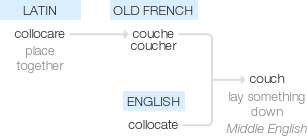Couch
Middle English (as a noun denoting something to sleep on; as a verb in the sense ‘lay something down’): from Old French couche (noun), coucher (verb), from Latin collocare ‘place together’ (see collocate).
wiktionary
From Middle English couche, cowche, from Old French couche, from the verb (see below). Doublet of cwtch.
From Middle English couchen, from Old French (se) couchier, (se) colchier(“to go to bed”), from Latin collocō(“to place, to set in order, to assemble, to settle”), from com-(“together, with”) + locō(“to put, to place, to set”). Doublet of collocate.
From quitch, from Old English cwice.
etymonline
couch (v.)
c. 1300, "to spread or lay on a surface, to overlay," from Old French couchier "to lay down, place; go to bed, put to bed," from Latin collocare "to lay, place, station, arrange," from assimilated form of com "with, together" (see com-) + locare "to place," from locus "a place" (see locus).
From late 14c. as "to lie down" (intransitive), also "cause to recline upon a bed or other resting place" (transitive). Meaning "lie hidden" is from 1580s. From 1520s as "to put into words;" hence "include the meaning of a word or statement, express in an obscure or veiled way, imply without distinctly saying" (1560s). Related: Couched; couching.
Heraldic couchant ("lying down with the head up") is late 15c., from the French present participle.
couch (n.1)
mid-14c., "a bed," from Old French couche "a bed, lair" (12c.), from coucher "to lie down," from Latin collocare (see couch (v.)). From mid-15c. as "a long seat upon which one rests at full length." Traditionally, a couch has the head end only raised, and only half a back; a sofa has both ends raised and a full back; a settee is like a sofa but may be without arms; an ottoman has neither back nor arms, nor has a divan, the distinctive feature of which is that it goes against a wall.
As symbolic of a psychiatric treatment or psychoanalysis, by 1952. Couch potato first recorded 1979.
couch (n.2)
in couch-grass, 1570s; a corruption of Old English cwice "living, alive" (see quick (adj.)).
